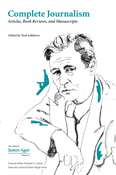Complete Journalism
Articles, Book Reviews, and Manuscripts

- Author(s): Ashdown, Paul
- Series: Collected Works of James Agee
- Imprint: Univ Tennessee Press
- Publication Date: 2013-12-15
- Status: Active
- Available in Hardcover - Cloth: Price $117.00 | Buy Now
- Leaf eReader required for PDF ebooks
In addition to producing such distinguished literary works as Let Us Now Praise Famous Men and A Death in the Family, James Agee spent almost two decades of his professional career in journalism, primarily as an anonymous staff writer for the Henry Luce magazines Fortune and Time. At Fortune, especially, Agee excelled in pointed, bemused reporting on American life that embraced a wide range of topics, from cockfighting to the restoration of Colonial Williamsburg to the ambitious programs of the Tennessee Valley Authority. What is arguably his most celebrated Fortune piece, “The Great American Roadside,” remains a remarkably prescient account of the ways in which the automobile was transforming America’s economic landscape and cultural sensibility.
This book, the second volume in The Works of James Agee series, recovers for modern readers the remarkable breadth and depth of Agee’s reportage, beginning with his apprenticeship writings for student publications at Exeter and Harvard in the 1920s and 1930s and concluding with his last book review (of a Dylan Thomas screenplay), written in 1953 for the New York Times. Also included are two posthumously published pieces—the Whitmanesque “Brooklyn Is” and a meditation on news photography and race relations, “‘America! Look at Your Shame!’”—as well as unpublished articles, book reviews, and rough drafts and notes that yield unique insight into theauthor’s complex writing process. (Excluded from this volume but scheduled for a later one is Agee’s much-heralded film criticism.)
To say that Agee was ambivalent about journalism is an understatement: in Let Us Now Praise Famous Men, he famously denounced it as “a broad and successful form of lying.” Yet, in his unsigned labors on behalf of the Luce empire and in various other assignments, Agee seized opportunities to hone his craft and exercise his acute powers of observation—work that would serve him well as he undertook the kind of passionate and deeply personal writing that would secure his reputation.
